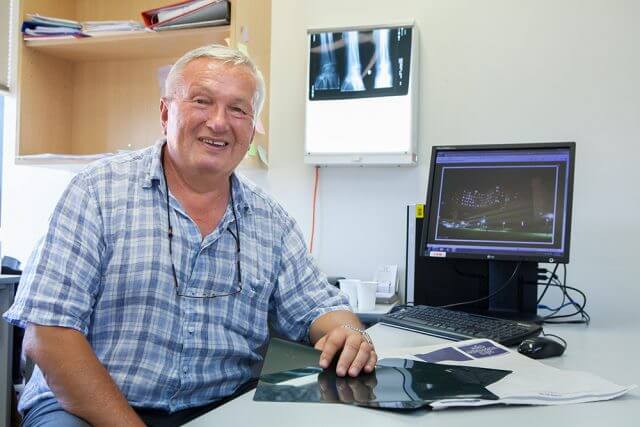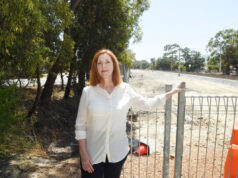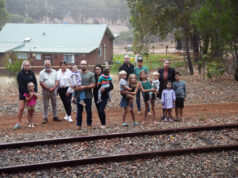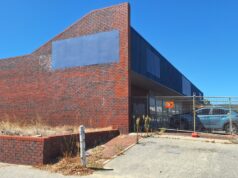From doctor in the Yugoslav army to heading up the fracture clinic at Armadale Kelmscott memorial hospital, Dr Milenko Kovac has seen the world and a lot of patients in his time. Editor Robyn Molloy finds out what brought him to Australia and why nearly everyone in the Armadale area knows him.
Dr Milenko Kovac, senior medical practitioner, orthopaedics, at the outpatient emergency department trauma clinic, recalls the days of dictator Josip Broz Tito, the Communist ruler from 1953 until his death in 1980, as a time when Yugoslavia was at the forefront of medicine in Europe.
It is far removed from the democratic Australia of today and the conflict-torn nation he left in the 1990s, but is where Dr Kovac started his career.
He joined the Yugoslav army as a doctor in a military hospital in Belgrade where he worked for 16 years.
“At that time president Tito, he made the hospital in Belgrade the best in Europe and I was impressed and I wanted to work in the hospital that at that time had CT scan,” he says, pulling up a website for the expansive hospital.
“This was built in 1979 and at that time Yugoslav army took in 400 young doctors in two years.
“Outpatients department would have 1000 patients a day and it was around 21 hectares under the roof plus what was underground for the army.”
While it was a military hospital with 50 per cent army staff, it was also open to the general population.
“That time in Yugoslavia, here people are thinking socialism was some sort of hierarchy, but it was more because this kind of hospital was specialised in cardio thoracic surgery, and all these high medicines … every man was to have free medical care, free education and an equal choice in life.”
Dr Kovac, who qualified as an orthopaedic surgeon in 1984, left Yugoslavia in 1992 after conflict ravaged the Balkans from 1991.
His accent is still thick.
“When the war started I wasn’t happy with it all because I didn’t think we should fight because in Yugoslavia there was seven million people from mixed marriages,” he says.
After leaving Belgrade, Dr Kovac headed to South Africa, Zimbabwe and New Zealand before arriving in Perth in 1998.
He started at Joondalup hospital before coming to Armadale the following year where he worked in the emergency department until 2007.
“Then I started this fracture clinic part time from 2007 to 2010 and then from 2010 it was open all the time,” he says.
Dr Kovac says he probably knows 70 per cent of people in the area, with about 10 a day recalling previous encounters.
And that’s no surprise as he sees more than 4000 people through the doors of the fracture clinic annually.
As senior medical officer in the emergency department from 2004, he helped many more.
His experience in the military exposed him to everything, even prisoners from 1991.
“In the military hospital, we had a big emergency department and every Wednesday we were on call for Belgrade and with surgical admissions maybe 100 and 400 to 500 would go through the emergency so as a young doctor you got exposed to everything,” he says.
“It is not like you have in Europe, you have a lot of narrow specialist hospital, you have only medical hospital, only fractures or disease.
“But in the army you must know everything. You must be prepared for everything because if you go somewhere you must know.”
Something he didn’t see much of in Yugoslavia but does in his current role is the devastating impact of high speed crashes.
“In Australia I have seen a lot of high speed injuries because of these quad bikes, motor bikes, it is much more often than Yugoslavia,” he says.
“In 25 years since I left, speed is increasing, people are getting more risky to get excited. In emergency you are getting people with 20 bones broken but before it would be one or two.
“And I always follow them up because we transfer them from the centre to Perth.
“There was one, he was a dentist, and they couldn’t pull him out. There was an electrical pole, it broke and fell on the car.
“He came back after six months. Ah ‘you that doctor that pulled me out’ I said ‘yes what’s wrong’, he said ‘only to say thanks’.”
Dr Kovac says even a small broken bone could have a big impact on someone’s life.
“If you have only a broken bone in your foot, it is affecting the whole body and your mind,” he says.
“I look at them if they come in, can they walk, are they limping, how are they looking in the face and if they are tired and frustrated, they must be more easy on them and not be a grumpy doctor.”
Dr Kovac hopes to make patient visits quick.
“I am efficient and most patients like that because I go straight to the point, finish and they are going home,” he says.
“I think because of all my experience I don’t make too many mistakes.”














